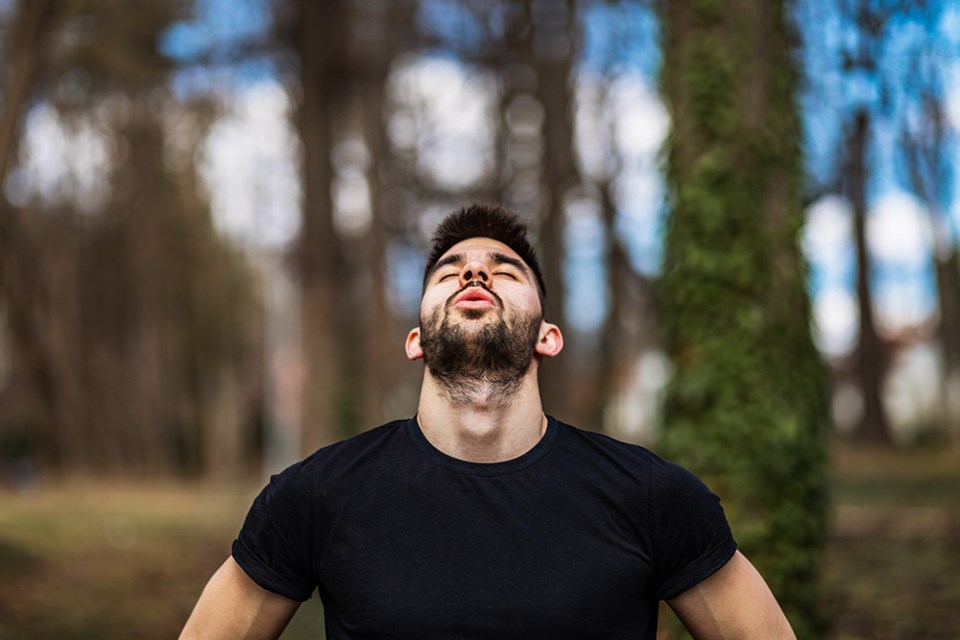Just breathe. My experience working toward mental and physical health and wellness involves gathering many tools during the ups and downs of recovery, which can possibly take years. Like a carpenter must gather enough diverse tools to build a strong house that will last through seasons of storms and sunshine, a diverse psychological box of tools are needed on the “road to recovery.”
Mine include an amalgamation of exercise (even when I don’t feel like), socializing (especially if I don’t feel like it) and gleaning valuable information from books, articles, counsellors, doctors and teachers of any shape or size. For example, my cat Henri has been an invaluable teacher on this long, curvy road. I needed to gather multiple psychological and physical healing therapies and tools and medicine.
That being said, as difficult as it would be, if I was absolutely forced to reduce everything to a single word it would be: breathe.
Breathing is at the centre of all neurological happenings. From our first gulp of oxygen as a baby to now, we almost breathe our reality into existence.
Breathe in and breathe out, then repeat the process roughly 17,000 to 25,000 times in a day as an involuntary action. We automatically breathe in oxygen, which finds a way into our bloodstream via lungs through a process called diffusion. Oxygen passes into our bloodstream and carbon dioxide leaves it.
Practicing slow, deep breathing will activate our parasympathetic nervous system, which can promote ease and relaxation. A valuable aid in helping avoid serious anxiety attacks or, at least, deep breathing can be a valuable in lessening the effect of that gnawing unease in life.
People who experience chronic and crippling anxiety are often prescribed potentially addictive drugs like, for example, benzodiazepines like Lorazepam or Ativan. The fast-acting anti-anxiety drugs can be effective for serious episodes of anxiety, however, the drugs can be addictive and dangerous.
When I was told to “just breathe” while experiencing serious anxiety in the form of agoraphobia or social anxiety, I would find myself in a worsened state. That is the problem, breathing slowly is an impossible task in real time.
A lot of meditative practice is required before conscious slow, deep breathing habits can activate the parasympathetic nervous system and induce a “rest and digest” brain-activated state of calmness.
In our brains, the primary control area for breathing is in the medulla oblongata, a part of the brain stem. It contains specialized cells called respiratory neurons, which send signals to the muscles involved in breathing. The cerebellum, at the base of the brain, also plays a role in automatic breathing. It helps to coordinate muscles involved in breathing and ensures everything is smooth and rhythmic.
Our breath is a reflexive and complicated nuero-physiological process that can be reduced to a simple skill. If practiced we have increased our potential to exert control over a reality, which often feels dangerously chaotic.
Poor breathing habits can contribute to feelings of anxiety. When the body is in a state of serious stress, breath tends to become shallow and rapid. This can lead to a decrease in the amount of oxygen that reaches the brain, which can exacerbate feelings of anxiety and panic. When we breathe deeply and fully, it can help activate the parasympathetic nervous system, which is responsible for the body's "rest and digest" response.
Learning the physiological and neurological part of breath has helped me demystify things and gain a bit of control over the process.
I still believe a recipe for mental wellness has a plethora of ingredients, nonetheless, controlling breath is a superpower that is convenient to keep in your back pocket.
So, breathe deeply and slowly, and things can get better. They always do.
Robert Skender is a qathet region freelance writer and health commentator.
Join the Peak's email list for the top headlines right in your inbox Monday to Friday.



